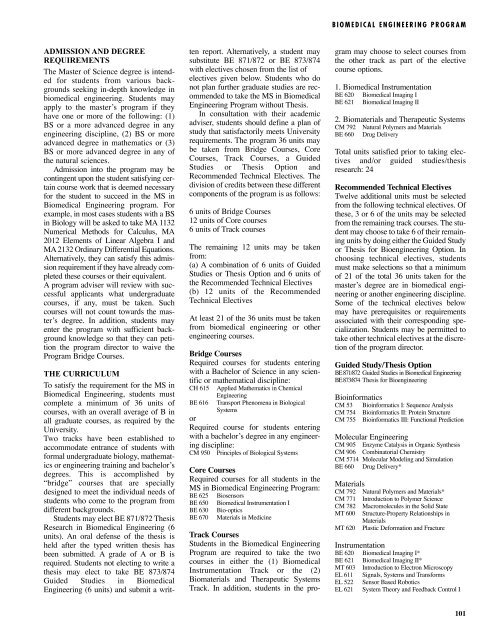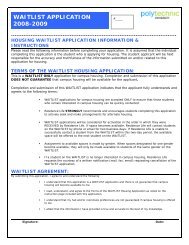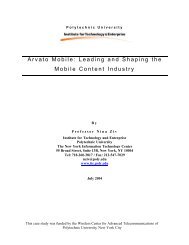POLYTECHNIC UNIVERSITY 2005-2007
POLYTECHNIC UNIVERSITY 2005-2007
POLYTECHNIC UNIVERSITY 2005-2007
You also want an ePaper? Increase the reach of your titles
YUMPU automatically turns print PDFs into web optimized ePapers that Google loves.
BIOMEDICAL ENGINEERING PROGRAM<br />
ADMISSION AND DEGREE<br />
REQUIREMENTS<br />
The Master of Science degree is intended<br />
for students from various backgrounds<br />
seeking in-depth knowledge in<br />
biomedical engineering. Students may<br />
apply to the master’s program if they<br />
have one or more of the following: (1)<br />
BS or a more advanced degree in any<br />
engineering discipline, (2) BS or more<br />
advanced degree in mathematics or (3)<br />
BS or more advanced degree in any of<br />
the natural sciences.<br />
Admission into the program may be<br />
contingent upon the student satisfying certain<br />
course work that is deemed necessary<br />
for the student to succeed in the MS in<br />
Biomedical Engineering program. For<br />
example, in most cases students with a BS<br />
in Biology will be asked to take MA 1132<br />
Numerical Methods for Calculus, MA<br />
2012 Elements of Linear Algebra I and<br />
MA 2132 Ordinary Differential Equations.<br />
Alternatively, they can satisfy this admission<br />
requirement if they have already completed<br />
these courses or their equivalent.<br />
A program adviser will review with successful<br />
applicants what undergraduate<br />
courses, if any, must be taken. Such<br />
courses will not count towards the master’s<br />
degree. In addition, students may<br />
enter the program with sufficient background<br />
knowledge so that they can petition<br />
the program director to waive the<br />
Program Bridge Courses.<br />
THE CURRICULUM<br />
To satisfy the requirement for the MS in<br />
Biomedical Engineering, students must<br />
complete a minimum of 36 units of<br />
courses, with an overall average of B in<br />
all graduate courses, as required by the<br />
University.<br />
Two tracks have been established to<br />
accommodate entrance of students with<br />
formal undergraduate biology, mathematics<br />
or engineering training and bachelor’s<br />
degrees. This is accomplished by<br />
“bridge” courses that are specially<br />
designed to meet the individual needs of<br />
students who come to the program from<br />
different backgrounds.<br />
Students may elect BE 871/872 Thesis<br />
Research in Biomedical Engineering (6<br />
units). An oral defense of the thesis is<br />
held after the typed written thesis has<br />
been submitted. A grade of A or B is<br />
required. Students not electing to write a<br />
thesis may elect to take BE 873/874<br />
Guided Studies in Biomedical<br />
Engineering (6 units) and submit a written<br />
report. Alternatively, a student may<br />
substitute BE 871/872 or BE 873/874<br />
with electives chosen from the list of<br />
electives given below. Students who do<br />
not plan further graduate studies are recommended<br />
to take the MS in Biomedical<br />
Engineering Program without Thesis.<br />
In consultation with their academic<br />
adviser, students should define a plan of<br />
study that satisfactorily meets University<br />
requirements. The program 36 units may<br />
be taken from Bridge Courses, Core<br />
Courses, Track Courses, a Guided<br />
Studies or Thesis Option and<br />
Recommended Technical Electives. The<br />
division of credits between these different<br />
components of the program is as follows:<br />
6 units of Bridge Courses<br />
12 units of Core courses<br />
6 units of Track courses<br />
The remaining 12 units may be taken<br />
from:<br />
(a) A combination of 6 units of Guided<br />
Studies or Thesis Option and 6 units of<br />
the Recommended Technical Electives<br />
(b) 12 units of the Recommended<br />
Technical Electives<br />
At least 21 of the 36 units must be taken<br />
from biomedical engineering or other<br />
engineering courses.<br />
Bridge Courses<br />
Required courses for students entering<br />
with a Bachelor of Science in any scientific<br />
or mathematical discipline:<br />
CH 615 Applied Mathematics in Chemical<br />
BE 616<br />
Engineering<br />
Transport Phenomena in Biological<br />
Systems<br />
or<br />
Required course for students entering<br />
with a bachelor’s degree in any engineering<br />
discipline:<br />
CM 950 Principles of Biological Systems<br />
Core Courses<br />
Required courses for all students in the<br />
MS in Biomedical Engineering Program:<br />
BE 625 Biosensors<br />
BE 650 Biomedical Instrumentation I<br />
BE 630 Bio-optics<br />
BE 670 Materials in Medicine<br />
Track Courses<br />
Students in the Biomedical Engineering<br />
Program are required to take the two<br />
courses in either the (1) Biomedical<br />
Instrumentation Track or the (2)<br />
Biomaterials and Therapeutic Systems<br />
Track. In addition, students in the program<br />
may choose to select courses from<br />
the other track as part of the elective<br />
course options.<br />
1. Biomedical Instrumentation<br />
BE 620 Biomedical Imaging I<br />
BE 621 Biomedical Imaging II<br />
2. Biomaterials and Therapeutic Systems<br />
CM 792 Natural Polymers and Materials<br />
BE 660 Drug Delivery<br />
Total units satisfied prior to taking electives<br />
and/or guided studies/thesis<br />
research: 24<br />
Recommended Technical Electives<br />
Twelve additional units must be selected<br />
from the following technical electives. Of<br />
these, 3 or 6 of the units may be selected<br />
from the remaining track courses. The student<br />
may choose to take 6 of their remaining<br />
units by doing either the Guided Study<br />
or Thesis for Bioengineering Option. In<br />
choosing technical electives, students<br />
must make selections so that a minimum<br />
of 21 of the total 36 units taken for the<br />
master’s degree are in biomedical engineering<br />
or another engineering discipline.<br />
Some of the technical electives below<br />
may have prerequisites or requirements<br />
associated with their corresponding specialization.<br />
Students may be permitted to<br />
take other technical electives at the discretion<br />
of the program director.<br />
Guided Study/Thesis Option<br />
BE 871/872 Guided Studies in Biomedical Engineering<br />
BE 873/874 Thesis for Bioengineering<br />
Bioinformatics<br />
CM 53 Bioinformatics I: Sequence Analysis<br />
CM 754 Bioinformatics II: Protein Structure<br />
CM 755 Bioinformatics III: Functional Prediction<br />
Molecular Engineering<br />
CM 905 Enzyme Catalysis in Organic Synthesis<br />
CM 906 Combinatorial Chemistry<br />
CM 5714 Molecular Modeling and Simulation<br />
BE 660 Drug Delivery*<br />
Materials<br />
CM 792 Natural Polymers and Materials*<br />
CM 771 Introduction to Polymer Science<br />
CM 782 Macromolecules in the Solid State<br />
MT 600 Structure-Property Relationships in<br />
Materials<br />
MT 620 Plastic Deformation and Fracture<br />
Instrumentation<br />
BE 620 Biomedical Imaging I*<br />
BE 621 Biomedical Imaging II*<br />
MT 603 Introduction to Electron Microscopy<br />
EL 611 Signals, Systems and Transforms<br />
EL 522 Sensor Based Robotics<br />
EL 621 System Theory and Feedback Control I<br />
101




